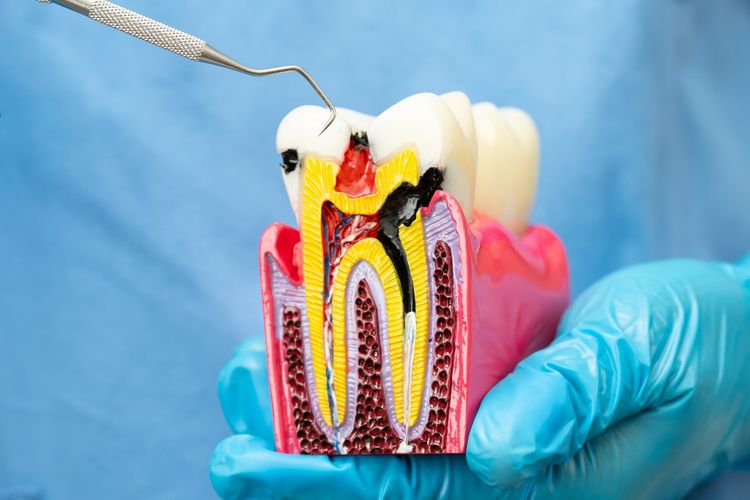Trafalgar Family Dental OneHunga
Expert Root Canal Treatment for Long-Lasting Relief
Root canal treatment is a procedure to repair and save a tooth that is badly decayed or becomes infected. During a root canal procedure, the nerve and pulp are removed and the inside of the tooth is cleaned and sealed. The whole procedure is very comfortable with local anaesthesia.
Without treatment, the tissue surrounding the tooth will become infected and abscesses may form. The tooth’s pulp or pulp chamber is the soft area within the root canal. The tooth’s nerve lies within the root canal. We use the latest technology and modern motors to make the procedure painless and comfortable for you
FAQs
What is a root canal treatment?
It is a dental procedure used to treat and save a tooth that is severely decayed with inflamed or infected dental pulp. It involves removing the infected pulp, cleaning the inside of the tooth, and sealing it to prevent further infection.
How do I know if I need a root canal?
Common signs include severe toothache, sensitivity to hot or cold, swelling in the gums, or discoloration of the tooth. Your dentist can confirm after an examination.
How long does the root canal procedure take?
Most root canals are completed in 1–3 visits. Each session typically lasts about 1–2 hours, depending on the complexity.
Will the tooth need a crown after a root canal?
Yes mostly , a crown is recommended after a root canal to protect the tooth and restore its function, especially for back teeth (molars or premolars).
Is root canal treatment painful?
Advanced techniques and anesthesia have made root canal treatment mostly very comfortable. You may feel some discomfort during or after procedure, which can be managed with over-the-counter painkillers.
Can I eat after a root canal?
Avoid eating until numbing effect wears off. You can eat soft foods and but it’s important to avoid chewing directly on the treated tooth until it’s fully restored with a crown.
What happens if I delay a root canal?
Infection inside tooth can get worse , leading to more pain, abscess formation, and sometimes even tooth loss.
How much does a root canal cost?
The cost depends on multiple factors such as tooth's location (front or back), severity of damage, and whether a crown is required. Your dentist can provide accurate estimates.
How long does a root canal last?
With proper care and oral hygiene , a tooth treated with a root canal can last many years . Good oral hygiene and regular dental check-ups are crucial.
Is a root canal better than extraction?
Saving your natural tooth with a root canal helps to maintain your bite, prevents loss of bone and further avoids the need for implants or bridges.
Does dental insurance cover root canals?
Many dental insurance plans cover a portion of the cost of root canal treatment. Check with your provider for details.
what is failure rate for root canal treatment ?
Like any other medical procedures, root canals can fail if the tooth gets re-infected, Fortunately percentage of failures is very small.
Can I get a root canal during pregnancy?
Yes, usually a root canal can be safely performed during pregnancy as emergency treatment. Inform your dentist, so necessary precautions are taken.
Are root canals safe?
Yes, root canals are generally safe and have been used as treatment for decades with proven effectiveness in treating infection’s and saving teeth.
Can a root canal be done on a crowned tooth?
Yes, if required , a root canal can be performed by accessing the tooth through the crown.

